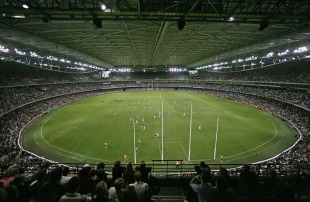|
Australia v New Zealand, Tri-Nations, Melbourne, July 31
Surface tension ahead of Bledisloe clash
Scrum.com
July 28, 2010

The AFL are considering a move away from Etihad Stadium
© Getty Images
Enlarge
The slippery playing surface at Melbourne's Etihad Stadium is overshadowing the build-up to Saturday's Tri-Nations clash, with the possibility that referee Craig Joubert could call off the Bledisloe opener if the ground is deemed unsafe. New Zealand have been denied the right to train at the venue ahead of their meeting with Australia as ground staff prepare the widely lamented surface for a busy weekend of action. Etihad is commonly used by the AFL and Aussie Rules games are scheduled for Friday and Sunday this weekend, but that sport is considering its future at the ground because of problems with players constantly losing their footing with the risk of injuries looming. The Australian media have been debating the topic, with issues ranging from the positioning of the sun over the stadium in winter to the type of studs being used by players being discussed. Although rugby has less directional changes than AFL, Joubert's verdict on the turf will determine whether the match between trans-Tasman rivals Australia and New Zealand will proceed. He has already expressed concerns to International Rugby Board referees manager Paddy O'Brien after hearing the damning reports on arrival from his native South Africa. All Blacks and Wallabies management are united in being comfortable with the game taking place. All Blacks coach Graham Henry had no doubt the game would proceed as scheduled, saying both sides would have to "make the best" of conditions. Wallabies counterpart Robbie Deans insisted the teams would be competing "on a level playing field". The All Blacks visit the stadium on Thursday to assess what the fuss is about, though they are forbidden to train on it as ground staff try to stabilise the surface ahead of Friday's AFL match between St Kilda and Essendon. "Obviously it's proven troublesome for the AFL but our game's a little different," said All Blacks assistant coach Steve Hansen. Rugby players wore different footwear and did not change direction the same way as in Aussie Rules, he said. The scrums, however, do pose a potential problem. "Obviously at scrum time we'll be hoping the surface holds together. At the end of the day we'll have to deal with it. If that means getting a bit closer as two forwards packs and scrummaging slightly different because of the surface that's what we'll do." O'Brien said uncontested scrums - employed when front row stocks were compromised by injury or foul play - were not an option if the surface could not handle the driving force of the packs. "At the end of the day, a referee's obligation is to check the playing surface. So it is his responsibility to make sure it is safe and that's what he's doing," O'Brien told The Australian newspaper. © Scrum.com
|
Live Sports
Communication error please reload the page.
-
Football
-
Cricket
-
Rugby
-
- Days
- Hrs
- Mins
- Secs
F1 - Abu Dhabi GP
Abu Dhabi Grand Prix December 11-131. Max Verstappen ()
2. Valtteri Bottas (Mercedes)
3. Lewis Hamilton (Mercedes)
4. Alexander Albon ()
5. Lando Norris ()
6. Carlos Sainz Jr ()
-
ESPNOtherLive >>
Golf - Houston Open
Snooker - China Open
Tennis - Miami Open

